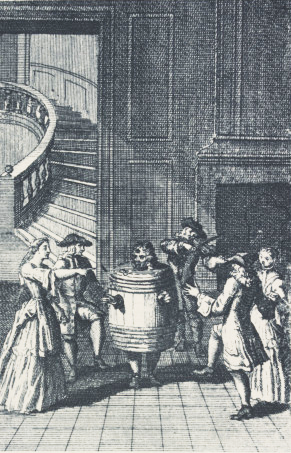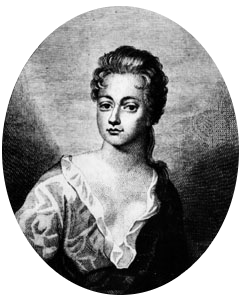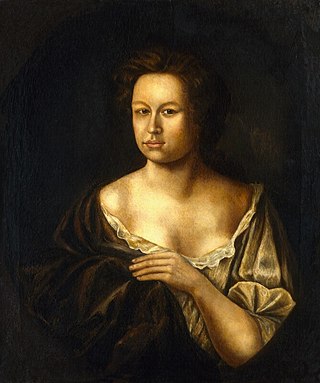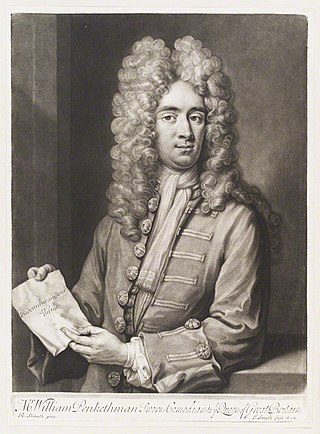Related Research Articles

Aphra Behn was an English playwright, poet, prose writer and translator from the Restoration era. As one of the first English women to earn her living by her writing, she broke cultural barriers and served as a literary role model for later generations of women authors. Rising from obscurity, she came to the notice of Charles II, who employed her as a spy in Antwerp. Upon her return to London and a probable brief stay in debtors' prison, she began writing for the stage. She belonged to a coterie of poets and famous libertines such as John Wilmot, Lord Rochester. Behn wrote under the pastoral pseudonym Astrea. During the turbulent political times of the Exclusion Crisis, she wrote an epilogue and prologue that brought her legal trouble; she thereafter devoted most of her writing to prose genres and translations. A staunch supporter of the Stuart line, Behn declined an invitation from Bishop Burnet to write a welcoming poem to the new king William III. She died shortly after.

Restoration comedy is English comedy written and performed in the Restoration period of 1660–1710. Comedy of manners is used as a synonym for this. After public stage performances were banned for 18 years by the Puritan regime, reopening of the theatres in 1660 marked a renaissance of English drama. Sexually explicit language was encouraged by King Charles II (1660–1685) personally and by the rakish style of his court. Historian George Norman Clark argues:
The best-known fact about the Restoration drama is that it is immoral. The dramatists did not criticize the accepted morality about gambling, drink, love, and pleasure generally, or try, like the dramatists of our own time, to work out their own view of character and conduct. What they did was, according to their respective inclinations, to mock at all restraints. Some were gross, others delicately improper.... The dramatists did not merely say anything they liked: they also intended to glory in it and to shock those who did not like it.
This article contains information about the literary events and publications of 1695.
This article contains information about the literary events and publications of 1690.
Susanna Verbruggen, aka Susanna Mountfort, was an English actress working in London.

Thomas Southerne was an Irish dramatist.
Barton Booth was one of the most famous dramatic actors of the first part of the 18th century.

Oroonoko: or, the Royal Slave is a work of prose fiction by Aphra Behn (1640–1689), first published in 1688 by William Canning and reprinted later that year in the compilation Three Histories by Mrs. A. Behn. The eponymous hero is an African prince from Coramantien who is tricked into slavery and sold to European colonists in Surinam where he meets the narrator. Behn's text is a first-person account of Oroonoko's life, love, and rebellion.
Charles Gildon, was an English hack writer and translator. He produced biographies, essays, plays, poetry, fictional letters, fables, short stories, and criticism. He is remembered best as a target of Alexander Pope in Pope's Dunciad and his Epistle to Dr. Arbuthnot and as an enemy of Jonathan Swift. Due to Pope's caricature of Gildon as well as the volume and rapidity of his writings, Gildon has become the epitome of the hired pen and literary opportunist.

Anne Bracegirdle was an English actress and soprano. Most of the plays she performed in involved singing as well as acting. She often performed music written for her by the composer John Eccles, and also sung music written for her by Henry Purcell. She became particularly well known for the song "I burn" which Eccles originally wrote for Bracegirdle to perform in Thomas D'Urfey's play The Comical History of Don Quixote (1694). She also sang music by Eccles in the play The Richmond Heiress (1693) and in William Congreve opera The Judgment of Paris. In 1706 she starred in Giuseppe Fedeli's opera The Temple of Love.
Mary Kent was an English actress, whose career lasted from 1692 to 1718. Her dates of birth and death are not known. She was the wife of Drury Lane actor Thomas Kent.

Mary Pix was an English novelist and playwright. As an admirer of Aphra Behn and colleague of Susanna Centlivre, Pix has been called "a link between women writers of the Restoration and Augustan periods".

William Pinkethman was an English comic actor, a low comedian with a droll style, and theatre manager. He was considered an imitator of Anthony Leigh.
John Bowman (1651–1739) was a British stage actor. He began his career in the Duke's Company at the Dorset Garden Theatre. In 1692, he married Elizabeth Watson, who acted under the name Elizabeth Bowman. He later switched to act at the Drury Lane Theatre. He is also referred to as John Boman.
Joseph Williams was an English stage actor of the seventeenth and early eighteenth century.
Elizabeth Willis (c.1669-1739) was a British stage actress.
Elinor Leigh was a British stage actor of the seventeenth century.
John Thurmond was a British stage actor. To distinguish him from his son, also an actor named John, he is sometimes called John Thurmond the Elder.
Elizabeth Bowman was an English stage actress of the seventeenth and early eighteenth century. The daughter of Sir Francis Watson, 1st Baronet she was adopted by the actor manager Thomas Betterton. In 1692, she married John Bowman and began acting at Drury Lane the following year as Mrs Bowman. She was a member of the United Company until 1695 then joined Betterton's breakaway at the Lincoln's Inn Fields Theatre.
John Hodgson was an English stage actor of the late seventeenth century. He joined the United Company in 1688 and his first recorded appearance was in The Treacherous Brothers at Drury Lane in 1690. In 1695 he was one of several actors who broke away to join Thomas Betterton's new company at Lincoln's Inn Fields. His name is sometimes written as Hudson. He was married to the singer Mary Hodgson.
References
- 1 2 Philip H. Highfill; Kalman A. Burnim; Edward A. Langhans (1975). A Biographical Dictionary of Actors, Actresses, Musicians, Dancers, Managers and Other Stage Personnel in London, 1660-1800: Cabanel to Cory. SIU Press. p. 216. ISBN 978-0-8093-0692-3.
- 1 2 William Penn (1857). Primitive Christianity Revived in the Faith and Practice of the People Called Quakers. Miller & Burlock. p. 3.
- ↑ Richard Kozar; William J. Burling (2000). Summer Theatre in London, 1661-1820, and the Rise of the Haymarket Theatre. Fairleigh Dickinson Univ Press. p. 43. ISBN 978-0-8386-3811-8.
- 1 2 Palmer, Alan; Palmer, Veronica (1992). The Chronology of British History. London: Century Ltd. pp. 200–201. ISBN 0-7126-5616-2.
- ↑ Mark A. Schneider (15 December 1993). Culture and Enchantment. University of Chicago Press. p. 1. ISBN 978-0-226-73927-4.
- ↑ Thomas DOGGET (1696). The Country Wake: a comedy. In five acts and in prose.
- 1 2 George Watson; Ian R. Willison; J. D. Pickles (2 July 1971). The New Cambridge Bibliography of English Literature: Volume 2, 1660-1800. Cambridge University Press. pp. 765–. ISBN 978-0-521-07934-1.
- ↑ She Ventures, and He Wins. A comedy ... For Hen. Rhodes. 1696.
- ↑ George Watson; Ian R. Willison; J. D. Pickles (2 July 1971). The New Cambridge Bibliography of English Literature: Volume 2, 1660-1800. Cambridge University Press. pp. 797–. ISBN 978-0-521-07934-1.
- ↑ John Dryden (29 September 1976). The Works of John Dryden, Volume XV: Plays: Albion and Albanius, Don Sebastian, Amphitryon. University of California Press. p. 330. ISBN 978-0-520-02129-7.
- ↑ W.H.G. Armytage (15 October 2013). Heavens Below: Utopian Experiments in England, 1560-1960. Routledge. p. 30. ISBN 978-1-134-52943-8.
- ↑ Berman, David (1995). Honderich, Ted (ed.). The Oxford Companion to Philosophy . Oxford: Oxford University Press. p. 877. ISBN 0-19-866132-0.
- ↑ Katharina M. Wilson; Paul Schlueter; June Schlueter (16 December 2013). Women Writers of Great Britain and Europe: An Encyclopedia. Routledge. p. 122. ISBN 978-1-135-61670-0.
- ↑ Holthöfer, Ernst (2001). "Domat, Jean". In Michael Stolleis (ed.). Juristen: ein biographisches Lexikon; von der Antike bis zum 20. Jahrhundert (in German) (2nd ed.). München: Beck. p. 180. ISBN 3-406-45957-9.
- ↑ Tilley, Arthur Augustus (2016). Madame de Sévigné: Some Aspects of Her Life and Character. Cambridge: Cambridge University Press. p. 154. ISBN 978-1-31662-004-5.
- ↑ Jean de La Bruyère (1970). Characters. Penguin Books. p. 13. ISBN 978-0-14-044221-2.
- ↑ Penny Cyclopaedia of the Society for the Diffusion of Useful Knowledge. C. Knight. 1843. p. 144.
- ↑ John A Newton ‘ Samuel Annesley 1620-1696)’ Proceedings of the Wesley Historical Society v.XLV 1985-6 pp 29-45 p.37